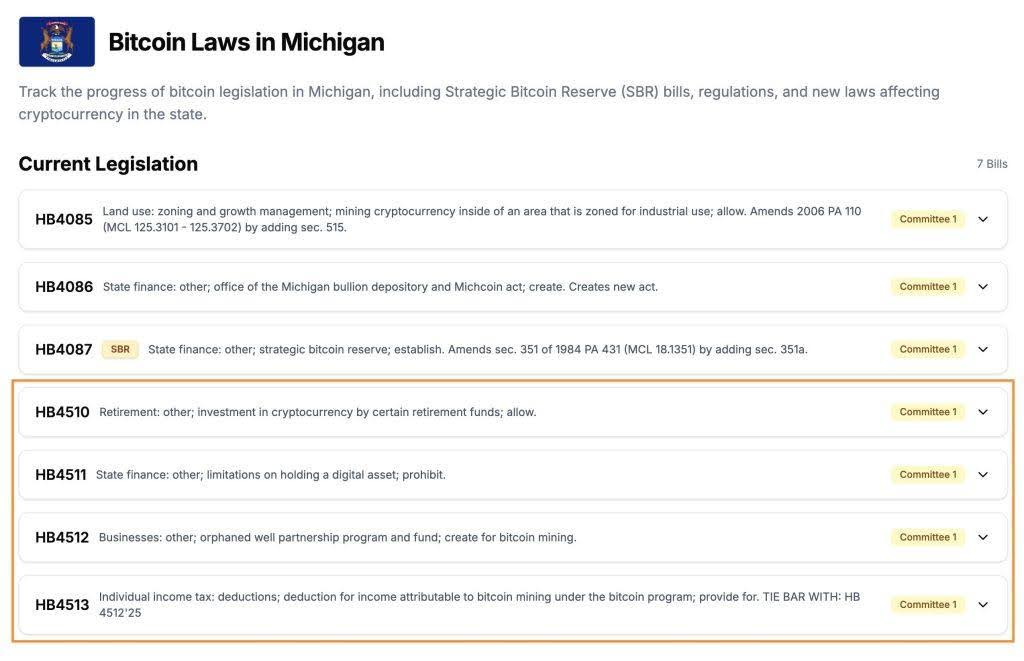Michigan Proposes Bold Crypto Legislation: Bitcoin Pensions, CBDC Ban, and Mining Incentives

Key Takeaways:
- Michigan lawmakers introduced four crypto-related bills focusing on Bitcoin pensions, a state-level ban on CBDCs, and green mining initiatives.
- House Bill 4510 allows public retirement funds to invest in Bitcoin via exchange-traded products.
- House Bill 4511 seeks to block state support for U.S. central bank digital currencies.
- Two additional bills promote the use of abandoned oil wells for Bitcoin mining tied to environmental remediation efforts.
Michigan’s Ambitious Crypto Agenda

Michigan is now one of the most active states in the U.S. when it comes to establishing laws that let people utilize cryptocurrencies. In early May 2025, a group of state politicians put forward four new bills. These measures all work toward making Bitcoin and other cryptocurrencies a part of Michigan’s public investment and environmental policies. They also seek to stop the rise of central bank digital currency (CBDCs), which are becoming more powerful.
The proposed legislation package takes a multi-faceted approach: it lets state pensioners invest in Bitcoin, encourages private sector innovation through eco-friendly mining, and asserts state sovereignty by refusing federal digital currency requirements.
Read More: Michigan’s Bitcoin Bet: State Considers Strategic Crypto Reserve
Bitcoin for Public Pension Funds (HB 4510)
Representative Bill Schuette’s House Bill 4510 is the most crucial portion of the legislative package. This law would let the Michigan Department of Treasury invest portion of the state’s retirement money in digital assets, specifically those that have been worth more than $250 billion in the past year. This only implies that you can only invest in Bitcoin because it is the most popular cryptocurrency.
Registered investment firms must manage exchange-traded products (ETPs) that investors can use to make these investments. This is to protect investors and make sure the laws are followed. This way, institutions can’t directly invest in cryptocurrencies, but they can still benefit from Bitcoin’s rise as a store of value.
Schuette said the idea was a “modernized investment strategy” that would help Michigan stay ahead of the curve in managing public funds by allowing investors the option to grow their money over time and protect it from inflation.
Blocking CBDC Support (HB 4511)
Michigan is against central bank digital currencies, even though it is generally pro-crypto. Representative Bryan Posthumus’s House Bill 4511 would make it illegal for any state agency or employee to support or promote any type of CBDC issued by the U.S. Federal Reserve.
The measure specifically stops states from doing things that would make it easier to use CBDC, such licensing, taxing, or setting up the technical infrastructure. There are two reasons for this: to safeguard financial privacy and to keep states’ money separate from the federal government.
Posthumus says that CBDCs, which are advertised as new ideas, could be very bad for people’s freedoms because they would let the government watch how people spend their money in real time. The bill echoes a growing national concern over the centralization of digital finance.

Eco-Friendly Bitcoin Mining (HB 4512 & HB 4513)
Rounding out the package are two environmentally focused bills introduced by Representative Mike McFall—House Bill 4512 and House Bill 4513. These bills propose a “Bitcoin Program” designed to repurpose Michigan’s thousands of abandoned oil and gas wells as low-emission crypto mining sites.
Private companies would be allowed to use residual fuels from these wells to power Bitcoin mining operations. In return, they must commit to environmental remediation and eventual site restoration. The initiative includes tax credits and temporary mineral rights, balancing industrial innovation with ecological responsibility.
Oversight of this program would fall under Michigan’s Supervisor of Wells, who would manage an open registry of eligible sites, enforce environmental standards, and ensure transparency throughout the process. It’s an approach that could turn environmental liabilities into economic assets.
Read More: Landmark Legislation to Target Crypto Fraud in New York State
A Model for Other States?
Michigan’s four-pronged legislative drive shows how cryptocurrencies, environmental policy, and state sovereignty are becoming more and more connected. Texas and Florida, for example, have taken efforts to assist crypto mining or restrict CBDCs. Michigan’s plan is different since it is so broad and looks ahead to future regulations.
These ideas are still being talked about, but they might be used as a model for other U.S. states that want to take advantage of decentralized banking while lowering its hazards.
As the crypto industry continues to mature, Michigan’s actions may very well signal a new phase of state-level leadership in the evolving digital economy.
The post Michigan Proposes Bold Crypto Legislation: Bitcoin Pensions, CBDC Ban, and Mining Incentives appeared first on CryptoNinjas.
